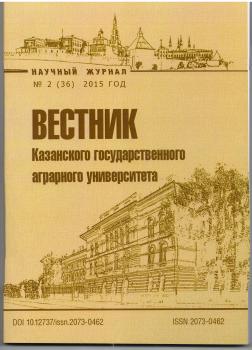Russian Federation
Russian Federation
CSCSTI 68.01
Investigations on light gray forest soils of the Chuvash Republic were carried out to study the effectiveness of the use of horn-ungulated meal or keratin as a nitrogenous organic fertilizer and zeolite-containing trefoil as a sorbent-type soil improver. The use of horn-ungulted meal as a nitrogen fertilizer of organic origin helps to enhance the biological activity of the soil. Observations during the vegetation period revealed a more intense coloration of the leaf surface, as well as an increase in the area of the assimilative surface of fodder beet and potatoes. The results of the determination of quality indicators has revealed the possibility of obtaining environmentally friendly products, as there has been a decrease in the content of nitrates in root crops fodder beet and potato tubers, increased dry matter content and sugar content in root crops fodder beet and in the tubers of potato dry matter and starch.The conducted studies have revealed the possibility of replacing the mineral form of nitrogen fertilizer with a nitrogen fertilizer of organic origin - horn-ungulated meal (keratin), which is a waste of the livestock industry. The joint application of zeolite-containing fossil meal together with horn-ungulated meal and phosphoric-potassium mineral fertilizers positively affected the increase in the use of nutrients from them not only in the row crops in the year of application, but also in the subsequent barley culture, increasing its yield and economic efficiency.
horn-ungulated meal, keratin, fossil meal, potatoes, fodder beet, barley, fertilizers.
В современных экономических условиях земледелие должно обеспечивать увеличение объемов производства при неизменных земельных ресурсах в результате систематического повышения плодородия почвы и роста урожайности возделываемых сельскохозяйственных культур.
Как в науке, так и в практике производства растениеводческой продукции, наибольший интерес проявляется к технологиям, обеспечивающим энерго-ресурсосбережение [9].
Кузнецов А.И. (2008) отмечает, что технологию возделывания сельскохозяйственных культур следует рассматривать как комплекс взаимосвязанных агроприёмов, преследующих однонаправленное позитивное действие, обеспечивающее проявление эффекта взаимодействия этих приемов. В этом случае достигается наибольший экономический результат. Составляющие интенсивной ресурсосберегающей технологии должны обладать и свойствами, обеспечивающими сбережение не только материальных и денежных затрат, но и самой почвы и ее плодородия в широком понимании этого основного качества пахотной земли [6].
Применение органических удобрений различной природы происхождения можно отнести как к одному из элементов ресурсосбережения. Потому как применение минеральных азотных удобрений под сельскохозяйственные культуры в результате денитрификации газообразные потери могут составить 15…30 %, в результате вымывания – от 5 до15%, поглощения микроорганизмами от – 25 до 35 %, растению достается лишь 40…50% [8].
В качестве органического удобрения можно использовать отходы всех отраслей сельскохозяйственного производства (рис.1). Так, в отрасли растениеводства – использование при производстве зерна побочной продукции соломы, а также поукосно – отаву многолетних трав или пожнивные промежуточные культуры на сидераты [3].
1. Robier J. Rol sevooborota v povyshenii plodorodiya pochvy (Avstriya). Eine gute Fruchtfolge ist wieder gefragt. Fortschr. Landwirt. [The role of crop rotation in improving soil fertility (Austria)]. 1988. 66, 6: I-2 (nem.).
2. Boyko A.P., Boyko E.F. Otsenka razlichnykh tipov sevooborotov po velichine otchuzhdaemoy i vozvraschaemoy biomassy. Povyshenie plodorodiya pochv Primorya. [Assessment of different types of crop rotations in terms of the amount of alienated and returned biomass. Increase in soil fertility in Primorye]. 1986. - P. 63-66.
3. Eliseev I.P. Bezotkhodnost selskokhozyaystvennogo proizvodstva - kak element energo-resursosberezheniya v zemledelii. //V sb. mat. I oy - Mezhd. nauch.-prakt. konf. “Dostizheniya sovremennoy nauki v oblasti energosberezheniya”. (Wastelessness of agricultural production - as an element of energy-resource-saving in agriculture. // In the collection of proceedings of I International Scientific and practical conference “Achievements of modern science in the field of energy conservation”). Cheboksary, 2013. - P. 87-89.
4. Eliseev I.P., Eliseeva L.V., Shashkarov L.G. Ispolzovanie rogo-kopytnogo shrota i trepela v zvene sevooborota s propashnymi kulturami. V sbornike: Prodovolstvennaya bezopasnost i ustoychivoe razvitie APK. Materialy Mezhdunarodnoy nauchno-prakticheskoy konferentsii. (Use of horn-ungulated meal and fossil meal in the link of crop rotation with tilled crops. In the collection: Food safety and sustainable development of agro-industrial complex. Proceedings of International Scientific and Practical Conference). 2015. - P. 96-100.
5. Eschenko V.E. and others. Osnovy opytnogo dela v rastenievodstve. [Fundamentals of experimental business in plant growing]. / V.E. Eschenko, M.F. Trifonova, P.G. Kopytko and others. Pod red. V.E. Eschenko i M.F Trifonova. - M.: KolosS, 2009. - P. 165-166.
6. Kuznetsov A.I. On the current problems of agriculture in Chuvashia. [O sovremennykh problemakh zemledeliya Chuvashii]. // Izvestiya Akademii nauk Chuvashskoy Respubliki. - Proceedings of the Academy of Sciences of the Chuvash Republic. №1. - Cheboksary, 2008. - P. 119-136.
7. Neklyudov A.D., Ivankin A.N., Bedrutina A.V. and others. Khimicheskaya utilizatsiya keratina iz rogo-kopytnogo i peropukhogo syrya. Materialy 3-ey mezhdunarodnoy nauchno-tekhnicheskoy konferentsii (Ptitsa, Ekologiya, Chelovek). (Chemical utilization of keratin from horn-ungulated and feathery raw materials. Proceedings of the 3rd International Scientific and Technical Conference (Bird, Ecology, Man)). M,: MGUPB, 1999. - P. 257.
8. Smirnov P.V. Agrokhimiya. [Agrochemistry]. / P.V. Smirnov, E.A. Muravin - 3-e izd., pererab. i dop.- M.: Agropromizdat, 1991. - P. 288.
9. Shpaar D. Zernovye kultury (Vyraschivanie, uborka, dorabotka i ispolzovanie). [Grain crops. (Cultivation, harvesting, improvement and use)]. / under the general edition of D. Shpaar.- M.: ID OOO “DLV AGRODELO”, 2008. - P. 656.





